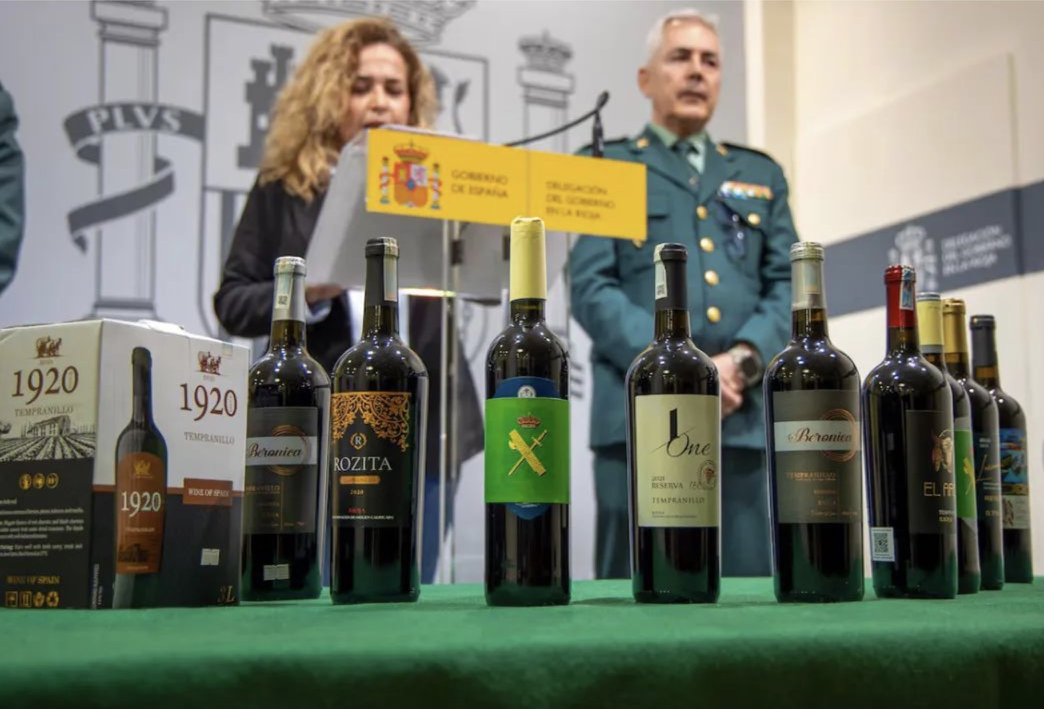The network is suspected of exporting up to 24,000 liters of fake wine, with an estimated financial impact reaching millions of dollars.
Spanish police have dismantled a transnational criminal network that smuggled counterfeit Rioja wine to China via Vietnam, authorities said. The network is suspected of exporting up to 24,000 liters of fake wine, with an estimated financial impact reaching millions of dollars.
The operation, codenamed Operation Epígrafe, was led by Spain’s Guardia Civil in collaboration with Europol, Interpol, and Vietnamese police. Seven Spanish nationals, aged 35 to 65, were arrested in Valencia and Álava and are under investigation.
Fake Rioja Discovered in Vietnam
The investigation was triggered in March 2023 when a Spanish tourist discovered a suspicious bottle of “Rioja wine” in a store in Vietnam. The label closely resembled authentic Rioja wines but was not linked to any registered Rioja winery. The tourist brought a sample back to Spain for analysis, which revealed that the bottle, label, cork, and packaging failed to meet the regulatory standards of the Denominación de Origen Calificada Rioja (DOCa Rioja). This finding prompted an in-depth probe by the Guardia Civil.
Authorities uncovered that the criminal network operated through three companies based in the Valencia region. These companies sourced non-Rioja wines from various parts of Spain, repackaging them into 5- to 15-liter bag-in-box containers before shipping them to Vietnam, where they were rebottled and relabeled as Rioja wine for distribution across Asian markets.
Investigators identified 17 misleading brands, including well known brands Alta Rioja, Beronica, Luxiumwine, 1910, and 1/One, which closely mimicked genuine Rioja labels, making them difficult for consumers to distinguish. A raid on the headquarters of one of the Valencia-based companies uncovered evidence linking the network to illegal exports of counterfeit Rioja wine to China. The total amount of fake wine exported to China reached 24,000 liters—equivalent to approximately 32,000 bottles of 750ml wine.
According to Guardia Civil spokesperson Miguel Ángel Sáez, the seven suspects face charges including industrial property infringement, involvement in a criminal organization, document forgery, and ongoing fraud. While they have been released pending trial, the investigation continues, focusing on quantifying the volume of fake wine distributed and the illicit profits generated.
Authorities have not ruled out the possibility that the network had made multiple illegal shipments to China. More individuals and companies could be implicated as the case develops.
Fake Wine Scandals in Europe
This is not the first large-scale counterfeit wine operation uncovered in Europe over the past year. In September 2023, French and Italian police dismantled a transnational network producing counterfeit wines from prestigious Burgundy estates including DRC. The operation resulted in the seizure of thousands of fake labels and materials used for fraudulent wine production, with the counterfeit wines estimated to be worth €2 million.
Among the six arrested suspects was Russian national Aleksandr Lugov, previously sentenced to four years in prison for selling 400 bottles of counterfeit Romanée-Conti and Domaine Leroy wines valued at €2.5 million.
Although the financial scale of these two cases differs, counterfeit wines are frequently sold in developing Asian markets, where wine consumption is growing but consumer awareness remains relatively low. China, for instance, has seen numerous cases of counterfeit high-end wine. In September 2023, authorities in Harbin, a city in northeastern China, seized more than 1,400 bottles of counterfeit Penfolds wine from a specialty liquor store, with a total estimated value of RMB 1.8 million (approximately $246,300).
Discover more from Vino Joy News
Subscribe to get the latest posts sent to your email.
Continue Reading
